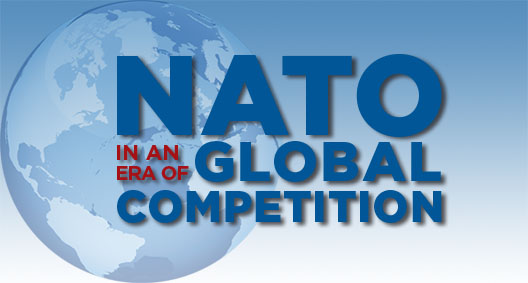 On June 25, the Atlantic Council and Norwegian Institute of Defence Studies held a capstone conference and report roll-out for the joint project: NATO in an Era of Global Competition.
On June 25, the Atlantic Council and Norwegian Institute of Defence Studies held a capstone conference and report roll-out for the joint project: NATO in an Era of Global Competition.
This eighteen-month effort, conducted jointly between the Atlantic Council and the Norwegian Institute for Defense Studies, aimed to define the role of NATO and the broader transatlantic community in an era of emerging security challenges, global power shifts, and new disruptive technologies. The conference convened leaders and experts from across Europe and North America to discuss the key report findings, including defining a new strategy for NATO, the impacts of the Ukraine crisis on NATO’s strategic calculus, and NATO’s future role in international security after the seminal 2014 Summit in Wales this September.
Opening Keynote & Remarks
In a moderated discussion with Barry Pavel, vice president and director of the Atlantic Council’s Brent Scowcroft Center on International Security, General Scowcroft outlined priorities for NATO as the Alliance moves into the Wales summit. General Scowcroft emphasized the need for “an innovative blend of strategy, force capability, and exercise,” as well as the imperative of interoperability, proper resources, and continuing the Alliance’s proven record at adjusting to fundamental geopolitical shifts. General Scowcroft also argued the need to adjust the rules of unanimity in NATO decision-making so to better enable those countries willing and able to go forward with NATO missions.
General Scowcroft also discussed challenges emanating from Ukraine and from instability across the Middle East. He argued that the United States was “sound asleep” in Ukraine until it became a crisis, neglecting the unique and delicate history between Ukraine and Russia. On the increasing instability in the Middle East, he warned Iraq and Syria pose very serious challenges and that “disillusionment [with] the nation-state system in the Middle East is something we have to recognize, and we are totally unprepared…to deal with that.”
The Alliance and Global Power Shift
Wolfgang Ischinger, Chairman at the Munich Security Conference began the discussion of the Council’s NATO in an Era of Global Competition conference entitled “The Alliance and the Global Power” shift by noting that Russia is an “important neighbor” whom we can no longer consider a partner but that we will continuously have to put up with as an alliance. He identified the formation of a “European Army” as a proper structure under which members of the European Union should ultimately approach the Kremlin. He also cited NATO as the “single most successful nonproliferation agent in history.”
Luncheon Conversation: The United States’ Future Role in European Security
The Atlantic Council’s NATO in an Era of Global Competition conference welcomed Derek Chollet, assistant secretary of defense for international security affairs at the US Department of Defense, for a luncheon conversation on the United States’ Future Role in European Security. The conversation, moderated by the Brent Scowcroft Center on International Security’s Senior Fellow Ian Brzezinski, began by applying President Obama’s recent remarks at the United States Military Academy at West Point to the current crisis in Ukraine.
Chollet shared the US government’s current relationship and experience with Ukraine’s new leadership as he discussed their current requests for support from the international community. He emphasized the current US focus on supporting Ukraine’s immediate needs for additional supplies including food for deployed troops, medical kits, and body armor. Chollet argued that, once Ukraine’s immediate needs are met, the United States will be able to help Ukraine plan for the future and meet its medium- to long-term needs.
Addressing the future of NATO, Chollet discussed continued support for NATO allies including Poland and NATO partners Azerbaijan and Georgia. He asserted that the United States will continue to support Poland as it develops its own capabilities including Poland’s missile defense system. Additionally, according to Chollet, NATO will focus its near term investments in Central Europe on developing infrastructure in the region. Both Azerbaijan and Georgia are close partners and the US will continue the current tempo of operations with both countries with a focus on increasing the relationship with Georgia.
Chollet closed by emphasizing the need for transatlantic support for US engagement in the Middle East. According to Chollet, the historic state-centric approach to dealing with threats will not work in the Middle East today and the change in the region will outlast the current administration. The only way the United States can properly engage the region, argued Chollet, is with steadfast transatlantic engagement and support.
Defending the Borders: Reassurance, Dissuasion, and Collective Defense
Leading experts on NATO’s traditional tools of reassurance, dissuasion, and deterrence gathered at NATO in an Era of Global Competition to address the implications of Russia’s continuing destabilization of Ukraine for European security and to assess the West’s response to this crisis.
Moderator James Goldgeier, dean of American University’s School of International Service, asked the panelists what Ukraine can do to bolster its deterrence and collective defense capacities in the wake of the Ukraine crisis since it is not a NATO member. Etienne de Durand of the Institut Français des Relations Internationales, Jo Gade of the Norwegian Institute for Defence Studies, and Kori Schake of the Hoover Institution at Stanford University brought a diverse synthesis of Western and European perspectives to the discussion. The panelists first outlined their thoughts on the future of Russia-NATO relations, the future of Article 5 threats, and President Obama’s European Reassurance Initiative.
